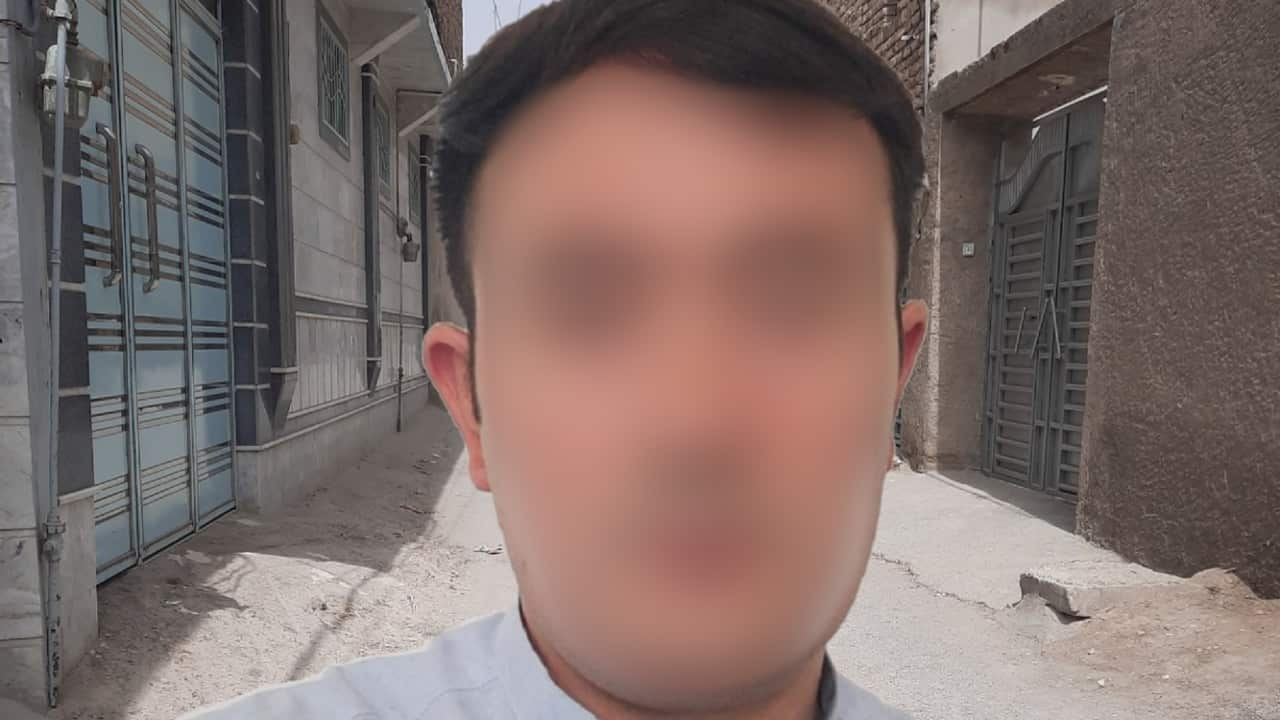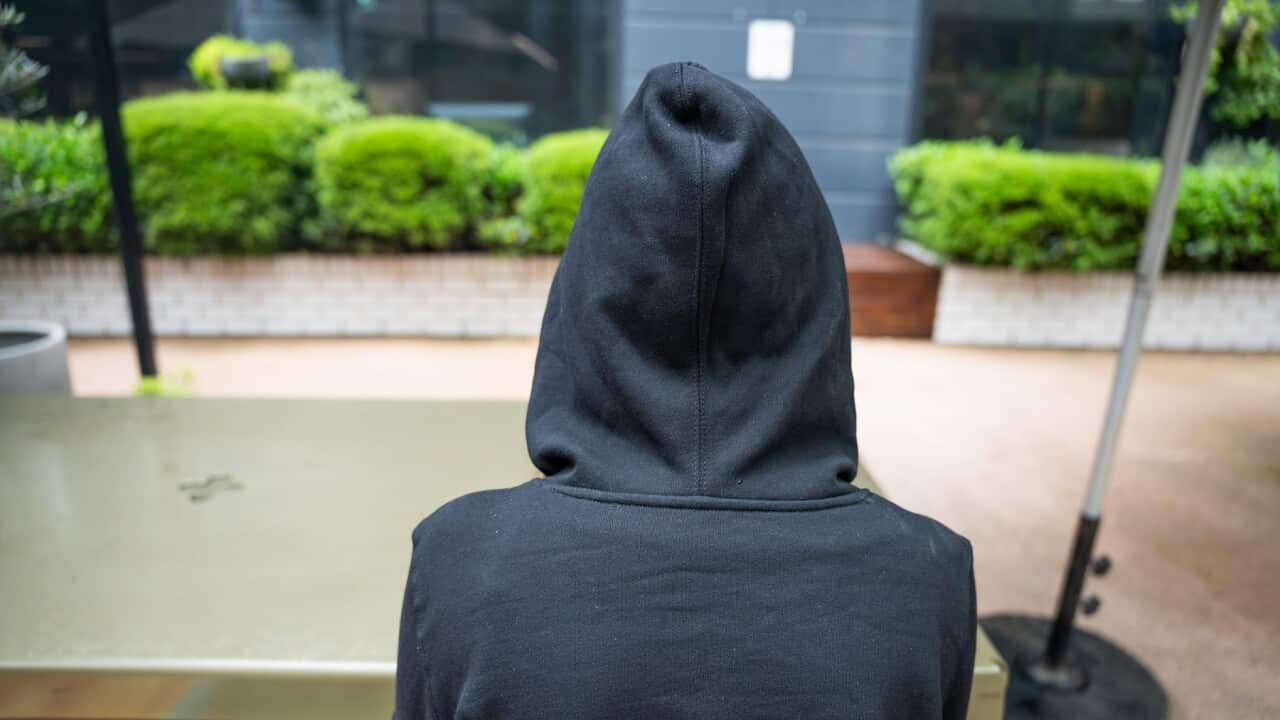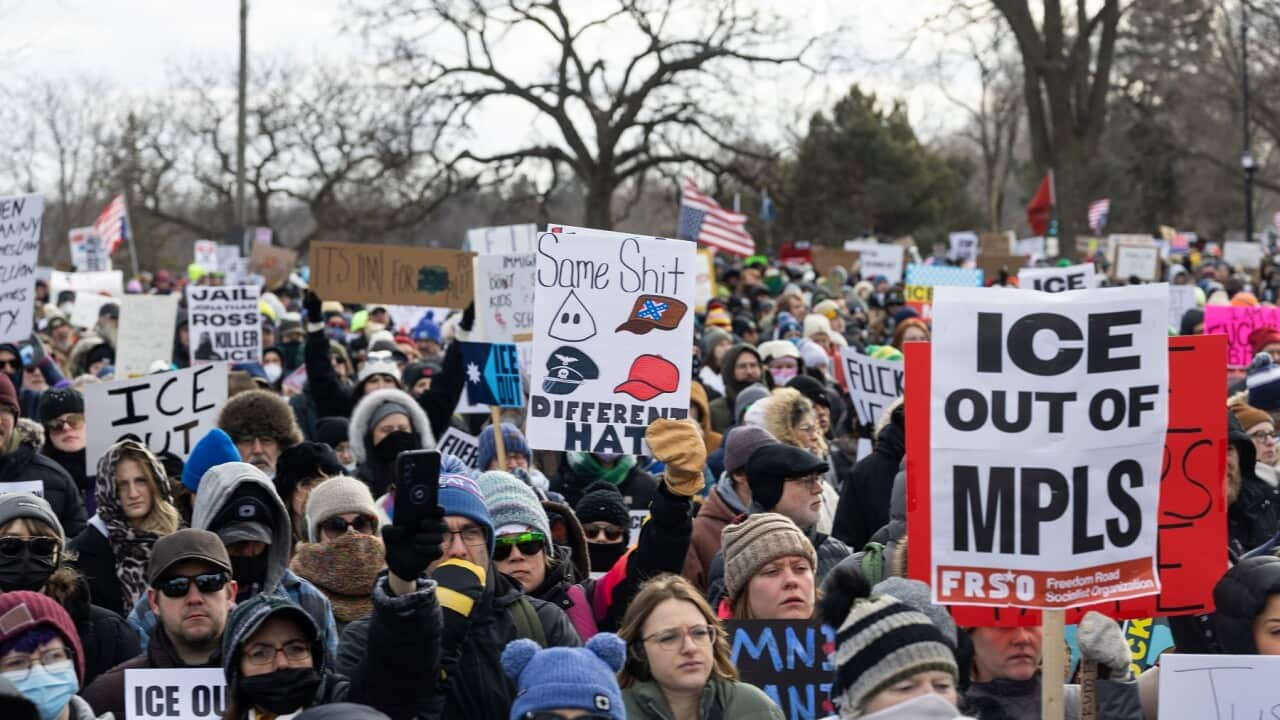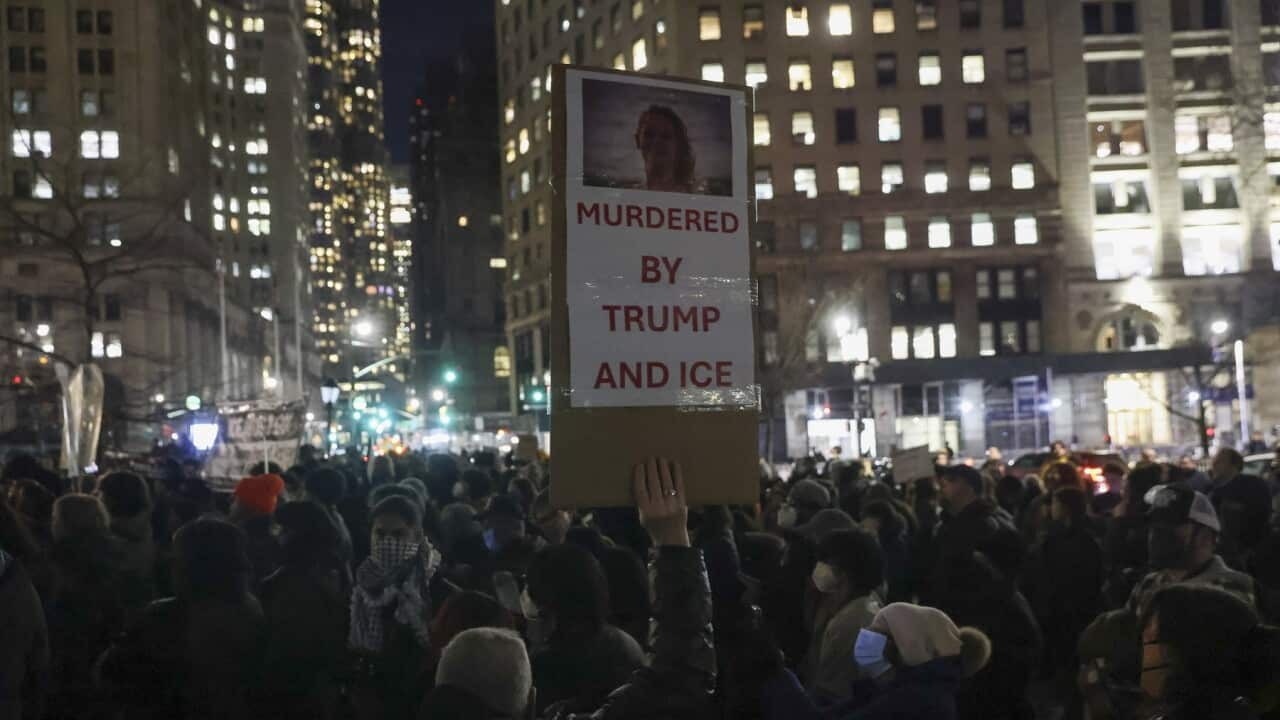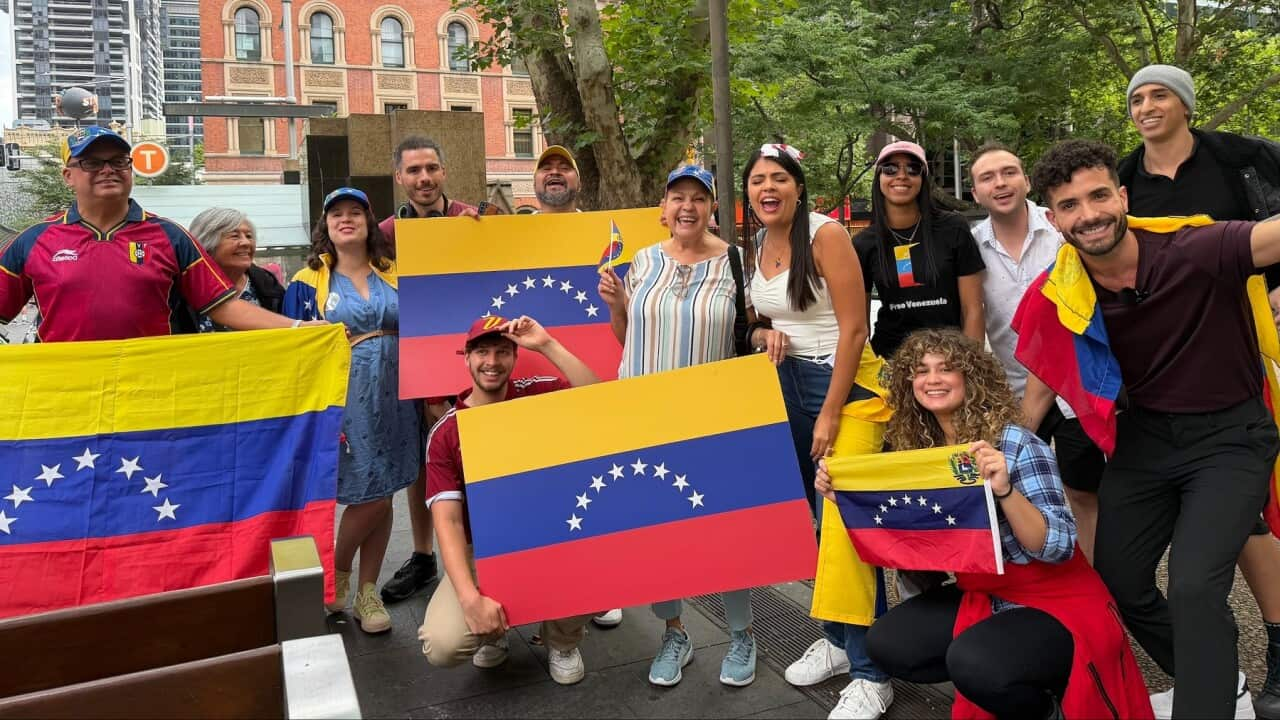Produced in collaboration with SBS Dari
Listen to Australian and world news, and follow trending topics with SBS News Podcasts.
TRANSCRIPT
Since fleeing the Taliban in 2021, Ahmad and his family have been living in limbo.
His name has been changed due to safety concerns as the country he currently resides in, Pakistan, has accelerated its drive to deport Afghan migrants who are staying illegally.
Ahmad says he has been the victim of the Taliban's violence after he was detained while attempting to leave Afghanistan due to him being of the Hazara ethnic group and wearing non-cultural attire.
"I was trying to reach Kabul airport hoping to leave the country. I was stopped at a checkpoint and they arrested me. They transferred me to unit zero six, which is known for torture. They accused me of working with foreign organisations and being against their Islamic values just because I look different and unusual."
During the United States military occupation of his country, Ahmad says he worked for a civil society organisation aimed at supporting peaceful movements against the Taliban and advocating for universal human rights values, including women's rights and the right to education.
After the US, Australia and their allies withdrew from Afghanistan in August of 2021, the Taliban swept back to power.
They quickly abolished the Western-backed administration and reportedly persecuted those who worked in the government and surrounding NGOs, accusing them of collaborating with foreign invaders.
"They tortured me and attempted to force me to confess that I had worked as a civil activist. However, I did not confess because I knew that if I admitted it, they would not release me and I would likely be killed."
Ahmad has provided SBS with photos of the injuries he claims to have suffered during this torture session which included bruises up his left arm and a wound on his face which required stitches.
After he was released from the interrogation, he fled with his parents and brother to Pakistan in October 2021.
When they arrived in the city of Quetta, he applied for a Refugee and Humanitarian visa to Australia on the 19th December.
Ahmad, his fiancé, his father, and his mother are all subject to the application and he claims they have been waiting more than 42 months for a non-automated response or an update from the Department of Home Affairs.
George Lombard, a senior solicitor at Playfair Legal who has assisted Afghan-Australians with family stuck in Pakistan, says humanitarian visa applicants often need to wait several years before their cases are considered.
"People sit in a holding pattern, if you like. We know that a lot of applicants applying from Pakistan have been threatened with repatriation by the Pakistani government. And underneath it all is the Australian government, which probably doesn't have the resources even to process the applications, let alone to reach in and find the people who are the most deserving and help them get visas. So it's a really, really difficult and frustrating process."
SBS understands that since Kabul fell to the Taliban in 2021, there has been over 300,000 humanitarian visa applications from Afghan citizens alone.
Each year, Australia's total humanitarian program offers 20,000 places for these applicants, which takes into account every other refugee-creating region in the world from Sudan to Myanmar, the Middle East and Ukraine.
We're told Afghan applicants make up the biggest of these cohorts admitted on humanitarian grounds but, even so, the majority of applications are expected to fail.
So, as the future of Ahmad's family hangs in the balance of the Australian government, they are living in fear of an intensifying effort by Pakistani authorities to detain and deport illegal Afghan migrants back to Afghanistan.
"We don't have access to work. We don't have access to go another place. We can't go out because Pakistan government deport illegal Afghan refugees. My friend was arrested by Pakistani police and deported to Afghanistan. It is so hard for my family, we haven't got any support and we are always afraid of being deported to Afghanistan again."
His people, the Hazaras, make up about nine per cent of Afghanistan's population and have faced persecution in the country for centuries.
In the last three decades, much of this persecution has been at the hands of the Taliban.
In March 2025, the Minority Rights Group told the United Nations Human Rights Council that Hazaras continue to face total political exclusion, arbitrary killings, sexual violence and displacement from their ancestral lands.
Lawyer George Lombard says it can be difficult for those like Ahmad's family to know what to do when faced with persecution at home and a lack of security elsewhere.
"People just don't know whether to go forward or back. People are desperately trying to stay in Pakistan in the hope that they'll sooner or later be approved. Given the volume, it's not something that's easily resolved. And I feel very sorry for the people who are caught in this terrible vice of being pushed from where they are and not able to find adequate refuge where they're hoping to go to."
Maryam Zahid is the CEO of Afghan Women on the Move, supporting women and girls to achieve economic and social independence in Australia.
She was able to flee the Taliban in 1999 and came to Australia as a refugee under the Women at Risk humanitarian visa program.
"I came 27 years ago from the first off wave of Taliban and I also lived in Pakistan and I also waited for UNHCR and the uncertainty of what life is going to look like for me for a 20 years old young girl and what a future holds for me. And I had no even idea how long it's going to take for my application to be processed, but I was one per cent of all applications globally to get a chance to come to Australia. And the work that I'm doing right now, it is because I have walked in their shoes."
She says many in her community have family in Pakistan facing the same challenges as Ahmad's.
"Several community members, they're part of our organisation and they are many more in the community that they're facing the worries of their remaining relatives and family members there. It's been now three and a half years that the majority of people that applied due to the fear of Taliban to come to Australia and seek refuge here. Their application is nowhere to be seen."
A spokesperson for the Department of Home Affairs says in a statement that the department cannot comment on individual cases due to privacy reasons.
SBS understands the department does prioritise applications by ethnic minorities such as the Hazaras when it comes to humanitarian visas, as well as women and girls, LGBTIQ+ applicants, former employees from the military occupation and the family of humanitarian visa holders.
Ms Zahid says the persecution of women and girls in Afghanistan is only escalating.
"The obvious one is the ban on secondary school and universities and education for girls. Everybody knows about that. They've also restricted employment opportunities, and also their limitation on freedom of movement, requiring a male guardian for travels. And barriers in terms of accessing healthcare and health concerns, especially mental health, let alone going to seek any support for any type of domestic and family violence. It's not even considered a worry in Afghanistan under the Taliban's rule."
Ahmad fears for this possible future for his fiancé and mother in Afghanistan, while he expects to face further violence and potentially death at the hands of the Taliban.
As he hides from Pakistani authorities and waits for news about his visa application after almost 1,300 days of uncertainty, he pleads for a lifeline from the Australian government.
"It has been 42 long and painful months since I applied for the humanitarian visa and right now I want from the Australian government to please process my application and save us from this hopeless situation."
This story was produced in collaboration with SBS Dari.
